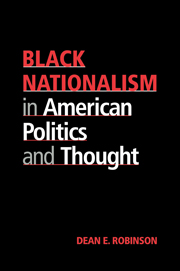Book contents
- Frontmatter
- Contents
- Acknowledgments
- Introduction
- 1 Anglo-African Nationalism
- 2 Malcolm X and the Nation of Islam
- 3 Black Nationalist Organizations in the Civil Rights Era
- 4 Black Nationalist Discourse
- 5 Black Nationalism as Ethnic Pluralism
- 6 Black Nationalism and the Ethnic Paradigm
- 7 Black Nationalism in the Contemporary Era
- Notes
- Selected Bibliography
- Index
7 - Black Nationalism in the Contemporary Era
Published online by Cambridge University Press: 12 January 2010
- Frontmatter
- Contents
- Acknowledgments
- Introduction
- 1 Anglo-African Nationalism
- 2 Malcolm X and the Nation of Islam
- 3 Black Nationalist Organizations in the Civil Rights Era
- 4 Black Nationalist Discourse
- 5 Black Nationalism as Ethnic Pluralism
- 6 Black Nationalism and the Ethnic Paradigm
- 7 Black Nationalism in the Contemporary Era
- Notes
- Selected Bibliography
- Index
Summary
This chapter brings my analysis of black nationalism in the United States to the end of the twentieth century. It investigates the two most prominent manifestations of black nationalism since the end of the black freedom struggle in the mid-1970s, the NOI under the leadership of Louis Farrakhan, and Afrocentricity as principally defined by Molefi Kete Asante. Of course, as in the past, black nationalism takes more forms than these two; and of the two, Afrocentricity as a scholarly enterprise doesn't meet my strict definition: this mostly scholar-led movement does not seek to establish a separate state. Nevertheless, Afrocentricity definitely grows out of the cultural nationalist tendency of the late 1960s and early 1970s.
Both Farrakhan's nationalism and Afrocentricity rest on assumptions that have dominated thinking about black life, culture, and mobility in the United States for more than half a century – what I referred to in the previous chapter as the “ethnic paradigm.” Reflecting nineteenth-century organic assumptions about race and culture, the NOI and Afrocentrists take as given the idea that cultures, if not races, are fundamentally different. They then make the New Darwinian argument that a defective culture, or “lack of identity,” hinders black progress. Both make some demands on the state; but, thus far, neither tendency firmly links its political trajectory to the efforts of labor, feminist, or other typically progressive political forces. Both offer, instead, highly idealistic proposals – one explicitly religious, the other quasi-religious – for group empowerment.
The current activities of the NOI under Farrakhan, and Afrocentricity as a scholarly enterprise, must be understood in the context of post-segregation era black politics.
- Type
- Chapter
- Information
- Black Nationalism in American Politics and Thought , pp. 118 - 136Publisher: Cambridge University PressPrint publication year: 2001



